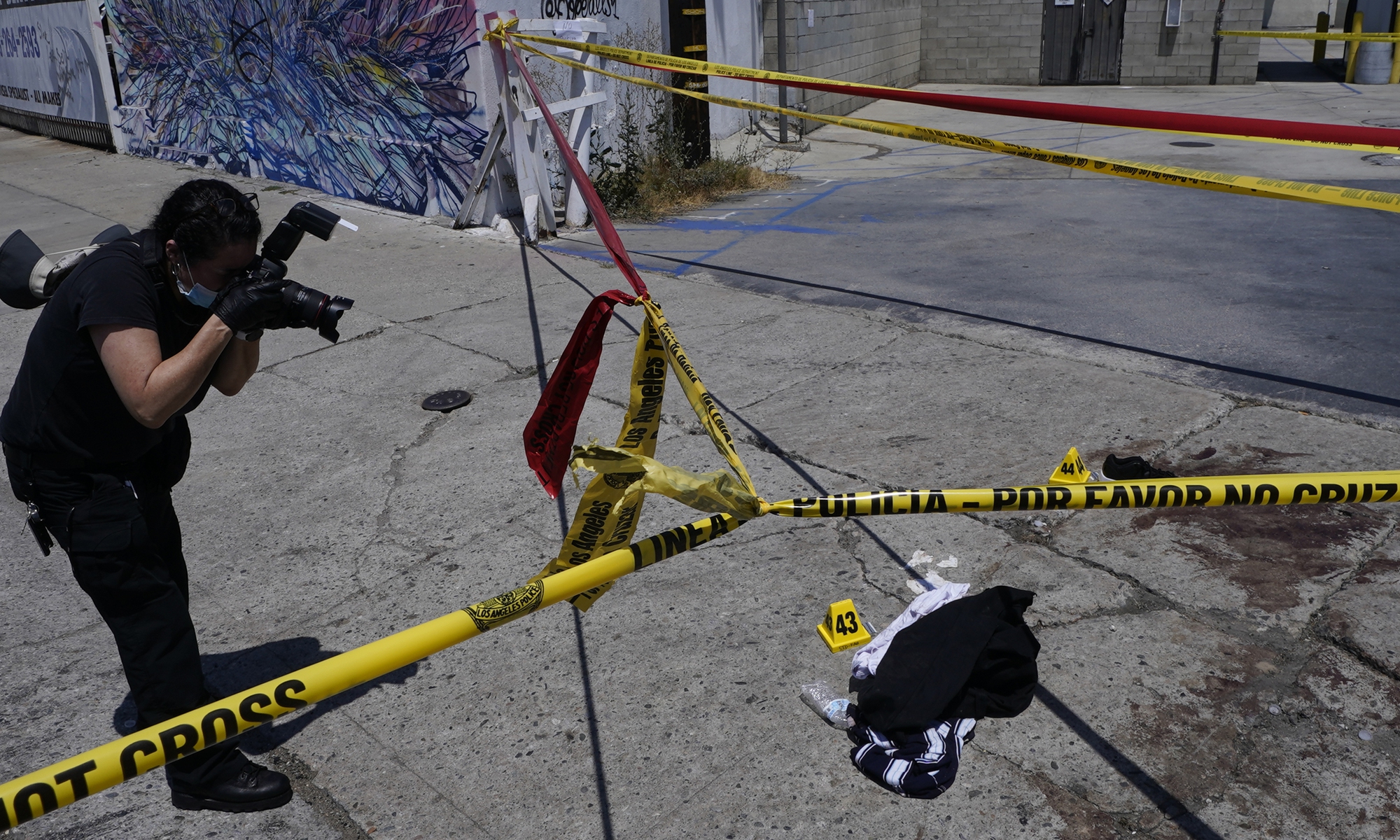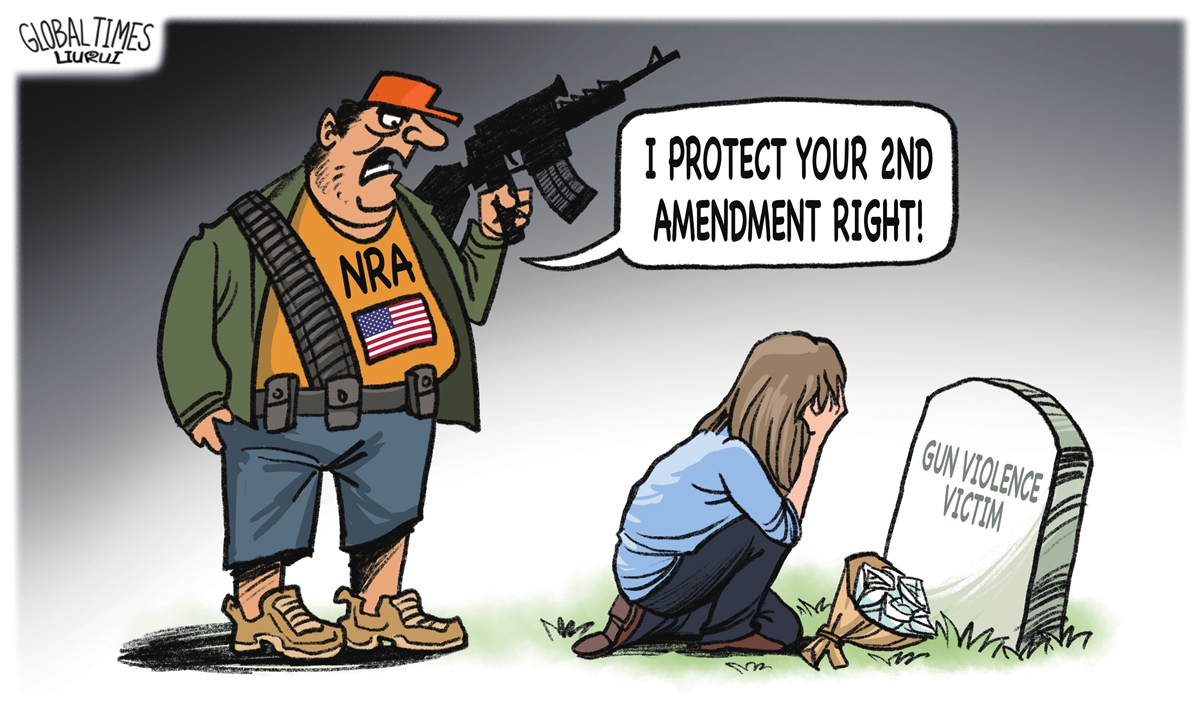
A Los Angeles Police field forensic photographer documents evidence after a shooting at a warehouse party in Los Angeles on June 12, 2022. Three people were killed and four others wounded in the latest mass shooting in the US. Photo: VCG
In the wake of a spate of mass shootings, a bipartisan group of US senators reached a tentative deal on gun control measures, which was hailed by US President Joe Biden as "important steps in the right direction," even if there's a long way to go before those measures are signed into law.
However, Chinese observers deemed the agreement a "political show" as the measures fall short of touching on the essence of gun control, and they believe the Democrats simply exploited the agreement to trick the public, in hopes of winning votes before the midterm elections. They also predicted that gun violence will be further fueled as American politicians show no sincerity in solving the problem, and social issues are fermenting as the country faces predicaments on many fronts.
The nascent agreement, announced on Sunday and endorsed by 10 Republicans and 10 Democrats, includes funding for US states to enact "red flag" laws that would authorize police to petition a court to bar certain individuals from possessing or purchasing a firearm.
It also tightens background checks and, for the first time, mandates a search of juvenile justice records for buyers under the age of 21 in addition to prohibiting those convicted of domestic violence against partners from owning guns.
The fact that the proposals are supported by 10 Republicans means they have the numbers to pass the bill.
"It does not do everything that I think is needed, but it reflects important steps in the right direction, and would be the most significant gun safety legislation to pass Congress in decades," Biden said in a statement on Sunday.
Democratic Senator Chris Murphy said a "substantial" part of the deal had been nailed down by negotiators, allowing the drafting of legislation to get under way on Monday, Reuters reported.
Yet Chinese experts see this so-called gun deal as a "scratching the surface" deal, as it falls short of the essence of gun control measures expected by the public, such as prohibiting the manufacture, transfer and possession of semi-automatic assault weapons and the transfer and possession of large-capacity ammunition feeding devices; and a change to the age at which a person needs to be to purchase an assault-style weapon.
The only solution to gun violence is to impose very strict measures on such assault weapons like other countries have done, said a professor from the Institute of International Relations at the China Foreign Affairs University in Beijing, who requested anonymity. Yet the possession of a gun is unshakable in the US and is guaranteed by the Second Amendment. US politicians and media can only "glorify" such minor steps to trick their public.
"This counts only as minor progress, but it falls short of strict gun control measures," Wei Nanzhi, a research fellow at the American Institute of the Chinese Academy of Social Sciences in Beijing, told the Global Times on Monday. She believes the mass shootings, ahead of the midterm elections in November, gives the Democrats the strongest impetus to push forward such a proposal to win votes.
But there's still a long and complicated way to go before those small measures are signed into law, said Wei.
During only the first six months this year, there were 263 mass shootings in the US, according to the Gun Violence Archive, a nonprofit that tracks shootings in the US. This includes the killing last month of at least 19 children and two teachers at an elementary school in Uvalde, Texas.
In 2013, the US Congress also took up gun background checks with bipartisan support after the 2012 Sandy Hook massacre that claimed the lives of 26 people, including 20 children. But the bill died in the Senate because it failed to override a filibuster.

US gun violence Illustration: Liu Rui/GT
A systemic malignant tumor
The frequent mass shootings in the US show that the COVID-19 pandemic has made the American society much more divided with a growing numbers of issues such as surging inflation and failing governance, and more social problems have accumulated, such as racial problems. The gun has become an outlet for the emotions and dissatisfaction of some US residents, Diao Daming, an associate professor at the Renmin University of China, told the Global Times on Monday.
In a Pew Research Center survey conducted in mid-April, around one-third of black adults (32 percent) said they worry every day or almost every day that they might be threatened or attacked because of their race or ethnicity. Around one-in-five Asian Americans (21 percent) said the same, as did 14 percent of Hispanic adults and 4 percent of white adults.
Observers also believe the constant gun violence in the US, and its politicians' nonfeasance toward such a "systemic malignant tumor," should strip the US of the moral high ground of accusing others about their "human rights" problems.
In response to a question on whether the Office of the UN High Commissioner for Human Rights will investigate the US' human rights violations, including racial problems and the gun control issue, UN Human Rights
Chief Michelle Bachelet said last month that her office has presented a report at the Human Rights Council on racial discrimination and problems of law enforcement in many countries, including the US and Europe.
Political elites in the US, with their unrealistic blindness to the quality of their own democracy, have repeatedly held up the US as a democratic model for the rest of the world, the above-quoted anonymous expert explained.
The expert also noted that as countries have come to realize the poor quality of American democracy and have developed social institutions that fit their national conditions, US rhetoric is increasingly difficult to convince others. The US perception of its democracy is not convincing either at home or around the world.





